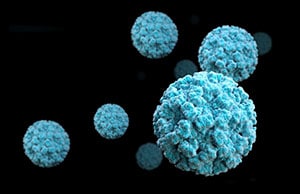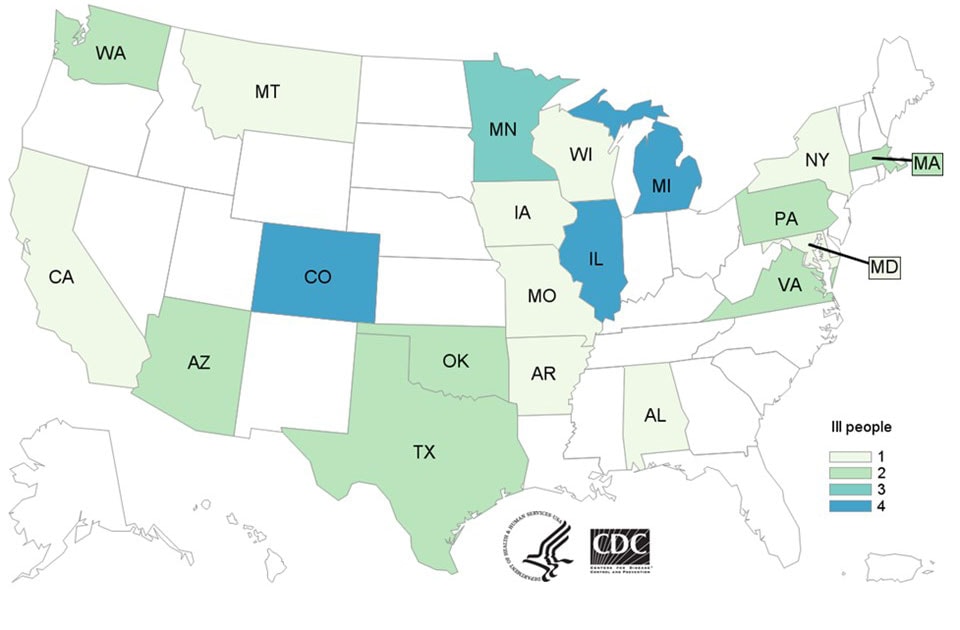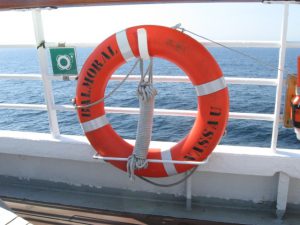Archive for the ‘Food-borne diseases’ Category
RNC: A dozen staffers in the California delegation who had arrived in Cleveland early have fallen ill with Norovirus
Wednesday, July 20th, 2016Nearly a dozen California Republican staffers are being quarantined an hour outside of Cleveland in an effort to prevent the spread of Norovirus
Wednesday, July 20th, 2016Eating mixed salad leaves in the U.K.: 151 cases of E. coli O 157 have been identified; 62 are known to have received hospital care and 2 have died.
Saturday, July 16th, 2016On 14 July Public Health England (PHE) is continuing to investigate an outbreak of E. coli O157, which appears to be associated with eating mixed salad leaves.
Following the last update on 5 July, PHE can now confirm that 151 cases of this strain of E. coli have been identified (figure correct as at 13 July 2016). This is 144 in England, 6 in Wales and 1 in Scotland, with the South West of England particularly affected. 62 of the cases are known to have received hospital care and sadly, 2 of the individuals with E.coli O157 infection have died.
Dr Isabel Oliver, director of PHE’s field epidemiology service, said:
PHE has been working to establish the cause of the outbreak and has identified that several of the affected individuals ate mixed salad leaves including rocket leaves prior to becoming unwell. Currently, the source of the outbreak is not confirmed and remains under investigation; we are not ruling out other food items as a potential source.
PHE is using various approaches including whole genome sequencing (WGS) technologies to test samples from those affected. WGStechnologies are at the forefront of improving the diagnosis of infectious diseases and this testing has indicated that the strain involved is likely to be an imported strain, possibly from the Mediterranean area.
PHE is also working closely with the Food Standards Agency to trace, sample and test salad products grown in the UK and other parts of Europe. All food sample results to date have been negative for E.coli O157, but it’s important to be aware that where food has been contaminated with E.coli O157, it is not always possible to identify the bacteria on food testing.
As an additional precautionary measure, we have advised a small number of wholesalers to cease adding some imported rocket leaves to their mixed salad products pending further investigations.
Previous updates
On 5 July PHE is continuing to investigate an outbreak of E. coli O157, which may be associated with eating mixed salad leaves. To date, 109 cases (figure correct as at 4 July 2016) of this strain of E. coli have been identified (102 in England, 6 in Wales and 1 in Scotland) with the South West of England particularly affected.
PHE has been working to establish the cause of the outbreak and has now identified that several of the affected individuals ate mixed salad leaves including rocket leaves prior to becoming unwell. Currently, the source of the outbreak is not confirmed and remains under investigation. PHE is now reminding people to maintain good hygiene and food preparation practices in response to the current outbreak.
E. coli O157 infection can cause a range of symptoms, from mild diarrhoea to bloody diarrhoea with severe abdominal pain. On rare occasions, it can also cause more serious medical conditions and can be caught by eating contaminated food or by direct contact with animals with the bacteria. It can also be passed from an infected individual to another person if hand and toilet hygiene is poor.
Dr Isabel Oliver, director of PHE’s field epidemiology service, said:
PHE has put in place heightened surveillance for this strain of E. coli and is carefully monitoring the reporting of cases across the entire country. To assist with this investigation to help us find the source, we have convened a national outbreak control team who will also ensure all necessary control measures are put in place.
Currently, the source of the outbreak is not confirmed and this remains under investigation. However, our preliminary investigations have indicated that several of the affected individuals ate salad items including rocket prior to becoming unwell. At this stage we are not ruling out other food items as a potential source.
We continue to stress the importance of good hand and food hygiene practices at all times. We urge people to remove any loose soil before storing vegetables and thoroughly wash all vegetables (including salads) that will be eaten raw unless they have been pre-prepared and are specifically labelled ‘ready to eat’. These measures may reduce the risk of infection from any E.coli contaminated vegetables, fruit and salad but will not eliminate any risk of infection completely. PHE is working alongside the Food Standards Agency and will provide any further necessary public health advice as investigations continue.
It’s also vital to wash hands thoroughly using soap and water after using the toilet, before and after handling food and after contact with any animals and pets, including farm animals. Small children should also be supervised when washing their hands.
The particular strain involved in the outbreak has been identified as phage type (PT) 34.
Multistate Outbreak of Shiga toxin-producing Escherichia coli O121 Infections Linked to Flour
Sunday, July 3rd, 2016Hundreds of passengers on a cruise ship travelling from the UK to the US have fallen ill: A norovirus outbreak?
Wednesday, May 11th, 2016Elizabethkingia anophelis
Friday, May 6th, 2016Wisconsin 2016 Elizabethkingia anophelis outbreak
The Wisconsin Department of Health Services (DHS), Division of Public Health (DPH) is currently investigating an outbreak of bacterial infections caused by Elizabethkingia anophelis.
The majority of patients acquiring these infections are over 65 years old, and all patients have a history of at least one underlying serious illness.
The Department quickly identified effective antibiotic treatment for Elizabethkingia, and has alerted health care providers, infection preventionists and laboratories statewide. Since the initial guidance was sent on January 15, there has been a rapid identification of cases and healthcare providers have been able to treat and improve outcomes for patients. DHS continues to provide updates of outbreak-related information that includes laboratory testing, infection control and treatment guidance.
At this time, the source of these infections is still unknown, and the Department continues to work diligently to control this outbreak. Disease detectives from the Department and the Centers for Disease Control and Prevention (CDC) are conducting a comprehensive investigation which includes:
- Interviewing patients with Elizabethkingia anophelis infection and/or their families to gather information about activities and exposures related to healthcare products, food, water, restaurants, and other community settings.
- Obtaining environmental and product samples from facilities that have treated patients with Elizabethkingia anophelis infections. To date, these samples have tested negative and there is no indication the bacteria was spread by a single healthcare facility.
- Conducting a review of medical records.
- Obtaining nose and throat swabs from individuals receiving care on the same units in health care facilities as a patient with a confirmed Elizabethkingia anophelis to determine if they are carrying the bacteria. To date, all of these specimens tested negative, which suggests the bacteria is not spreading from person to person in healthcare settings.
- Obtaining nose and throat swabs from household contacts of patients with confirmed cases to identify if there may have been exposure in their household environment.
- Performing a “social network” analysis to examine any commonalities shared between patients including healthcare facilities or shared locations or activities in the community.
| Type of Cases | Number of Cases |
|---|---|
| Confirmed | 60 |
| Under investigation | 0 |
| Possible cases** | 4 |
| Total cases reported to Wisconsin DPH | 64 |
Affected counties include Columbia, Dane, Dodge, Fond du Lac, Jefferson, Milwaukee, Ozaukee, Racine, Sheboygan, Washington, Waukesha and Winnebago.
There have been 18 deaths among individuals with confirmed Elizabethkingia anophelis infections and an additional 1 death among possible cases for a total of 19 deaths. It has not been determined if these deaths were caused by the infection or other serious pre-existing health problems. Counties where these deaths occurred are: Columbia, Dodge, Fond du lac, Milwaukee, Ozaukee, Racine, Sheboygan, Washington and Waukesha.
*This investigation is ongoing. Case counts may change as additional illnesses are identified and more cases are laboratory confirmed.
**These are cases that tested positive for Elizabethkingia, but will never be confirmed as the same strain of Elizabethkingia anophelis because the outbreak specimens are no longer available to test.











